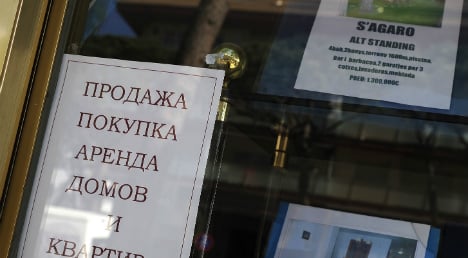The sharp fall of the Russian currency, driven by slumping oil prices and sanctions over Moscow's backing for separatists in Ukraine, knocked some Spanish estate agents back down just as they were staggering to their feet.
"Russians are not buying right now," said Ramon Riera, president of FIABCI Espana, a grouping of 120 property specialists.
"What's more, some Russians are actually getting rid of their properties here in Spain. There were some deals that were about to go through but the Russians have disappeared."
Purchases of properties in Spain by Russians were already declining steadily last year, according to the College of Registrars.
They fell from 8.8 percent of the total in the first quarter of 2014 to 7.5 percent in the third quarter, according to its latest figures.
And that was before the sharpest plunge in the rouble in mid-December.
Overall, the rouble lost 40 percent of its value against the euro and 45 percent against the dollar in 2014.
Russia's government forecasts its economy will shrink by three percent in the first quarter of 2015 after growing just 0.6 percent overall last year.
Riera also fears that amid the crisis, Russian authorities are encouraging their compatriots to stay in the country and buy holiday homes on the Black Sea.
After Spain's construction sector collapsed in 2008, "lots of people were looking to work the Russian market, because it was the strong market," said Riera.
Russians above all went for relatively cheap properties near the Mediterranean beaches of Spain's sunny eastern coast.
In 2013 they bought more than 2,000 properties in the eastern Valencia region and 989 in Catalonia in the northeast, according to the General Council of Notaries. Hundreds also bought in the hot southern region of Andalucia.
At the same time, Spain saw a surge in Russian tourists visiting.
"In the past five or six years it was like the Russians suddenly landed," said Federico Alvargonzalez, sales director of La Gavina, a luxury hotel on Catalonia's Costa Brava coast.
"The Russians are a bit more profitable than other clients. They order more expensive rooms and spend more on dining and wine," he said.
"That may have made some people get carried away."
But the tide turned last year as tensions rose in Ukraine — where over 5,400 people have died in fighting between Ukrainian forces and pro-Russian separatists.
The number of Russian tourists to Spain fell to 1.4 million in 2014, down 10 percent compared to the previous year, according to figures from Spain's tourism ministry.
Hotel manager Iker Llano fears the impact of the recent turbulence will continue this summer.
At his Piramide Salou hotel on the coast south of Barcelona, Russians account for 70 percent of revenues.
He fears Russia's problems will have an impact "not just on the number of tourists who come here, but that those who do come will have much less spending power".
Some in Spain still have hope in the Russian market, however. Despite the decline, Russians were still the third-biggest foreign buyers of homes in Spain last year, after the British and French.
"There will still be business with them," said Kristina Szekely, owner of the luxury real estate agency Sotheby's International Realty based in the southern Spanish resort of Marbella.
"Maybe some Russians are having to sell now because of the economic situation. But that will interest other Russian buyers."
On the eastern Costa Blanca, local budget official and tourism councillor Joaquin Albaladejo says that "so far, we are not noticing" a disappearance of the Russians.
Torrevieja, a resort town on the Costa Blanca, has drawn more Russian residents than any other destination in Spain — 5,300 of them are registered there, double the figure from a decade ago.
Torrevieja benefits from regular flights from Russia to the nearby Alicante-Elche airport, Albaladejo said.
Nearly 162,000 Russians passed through that airport in 2014 up to November – 31 percent more than in 2013, according to airports operator AENA.
Riera added that Spanish property dealers can also concentrate more on the many potential buyers on their doorstep, from Britain, France and Germany – at least until the Ukraine crisis is resolved.




 Please whitelist us to continue reading.
Please whitelist us to continue reading.
Member comments